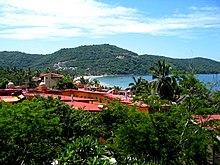The Zihuatanejo Project was a psychedelic training center and intentional community created during the beginning of the counterculture of the 1960s by Timothy Leary and Richard Alpert under the umbrella of their nonprofit group, the International Federation for Internal Freedom (IFIF). The community was located in Zihuatanejo, Guerrero, Mexico, and took up residence at the Hotel Catalina in the summers of 1962 and 1963.[1]

Background
editLeary and Alpert first discovered the town of Zihuatanejo in 1960. After the Marsh Chapel Experiment in 1962 they decided the area would make a good location for a training center.[2] The idea for the community was influenced by Aldous Huxley's fictional novel, Island (1962).[3][4]
Training program
editThousands of people applied to the IFIF in the hopes of joining the project in Zihuatanejo.[5] Out of this pool of applicants, a small, select group of people were chosen. Amenities cost $200 a month per person, including food and lodging in bungalows near a secluded beach. Fishermen supplied a bounty of fresh fish from the bay. During the first training session in 1962, Leary and 35 guests rented the Catalina Hotel for a month using their own version of the Tibetan Book of the Dead as a guide book for LSD sessions; Ralph Metzner and Richard Alpert helped manage the group.[6] Group LSD sessions began in the morning with the consumption of liquid LSD, with a dosage of 100 to 500 micrograms ingested by participating individuals; the experience would usually last until late afternoon.
Closure
editImmigration officials were tipped off to the project when the Mexican media began reporting stories about an "LSD Paradise". In the summer of 1963, after only six weeks (May 1 - June 16), the Mexican authorities shut the community down. Officials removed the group from Zihuatanejo and sent them to Mexico City aboard a chartered DC-3.[7] Several failed attempts were made to move the training center to Dominica and Antigua. In August 1963, with the help of wealthy patrons, Leary and their group moved to the Hitchcock Estate in Millbrook, New York, where they stayed until 1968.[2][8][9]
Media
editLeary talks extensively about the project on the 1966 recording, Turn On, Tune In, Drop Out: Timothy Leary Ph.D. speaks on L.S.D.[10]
References
edit- ^ Leary, Timothy; Richard Alpert; Ralph Metzner. 1964. "Rationale of the Mexican Psychedelic Training Center". In Richard Blum: Utopiates: The Use and Users of LSD-25, 178-186. New York: Atherton Press. ISBN 0202363244.
- ^ a b Conners, Peter. 2010. White Hand Society: The Psychedelic Partnership of Timothy Leary & Allen Ginsberg. City Lights Books. ISBN 0872865754.
- ^ Greenfield, Robert. 2006. Timothy Leary: A Biography. Houghton Mifflin Harcourt. ISBN 0-15603-206-6. 186.
- ^ Lattin, Don. 2011. The Harvard Psychedelic Club: How Timothy Leary, Ram Dass, Huston Smith, and Andrew Weil Killed the Fifties and Ushered in a New Age for America. HarperCollins. ISBN 0-06165-594-5. 2011, 99, 112.
- ^ Lee, Martin A. & Shlain, Bruce. 1992. "Preaching LSD". Acid Dreams: The Complete Social History of LSD: The CIA, the Sixties, and Beyond, Grove Press, ISBN 0-8021-3062-3. 96-98.
- ^ Dass, Ram; Metzner, Ralph; Bravo, Gary. 2010. Birth of a Psychedelic Culture: Conversations about Leary, the Harvard Experiments, Millbrook and the Sixties. Synergetic Press. ISBN 9780907791386.
- ^ Hollingshead, Michael. 1973. "Leary Flies his Jolly Roger from the Ivy Tower". The Man who Turned on the World. Blond and Briggs. London. ISBN 0-85634-015-4. Hollingshead's account is from Dusheck, George. July 2, 1963. "Paradise Lost by Mexico LSD Colony." San Francisco News-Call Bulletin.
- ^ Miles, Barry. 2005. Hippie. Sterling Publishing Company, Inc. ISBN 1-4027-2873-5
- ^ Hamilton, Neil A. 2002. Rebels and Renegades: A Chronology of Social and Political Dissent in the United States, Taylor & Francis. ISBN 0-415-93639-X. 260-261.
- ^ Leary, Timothy (speaker) (1966)[2009]. Turn On, Tune In, Drop Out (Audiobook). Brooklyn: ESP-Disk. OCLC 828183205.
Further reading
edit- Downing, Joseph J., 1964, "Zihuatanejo: An Experiment in Transpersonative Living." In Richard Blum: Utopiates: The Use and Users of LSD-25, 142-77. New York: Atherton Press. ISBN 0202363244
- Fisher, Gary. 2005. "Treating the Untreatable." In Roger Walsh and Charles S. Grob: Higher Wisdom: Eminent Elders Explore the Continuing Impact of Psychedelics, 103-17. Albany: State University of New York Press. ISBN 1423747720
- "No Illusions", Newsweek. June 10, 1963
- Stevens, Jay, 1998, Storming Heaven: LSD and the American Dream, Grove Press, ISBN 0-8021-3587-0